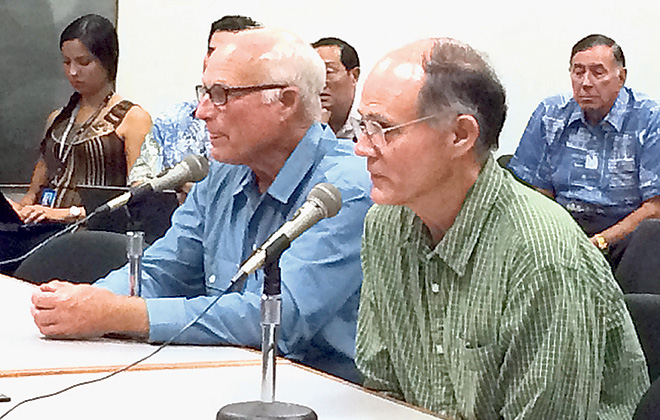Fishing restrictions around Niihau would be set by a single individual on the island under a bill approved last week by a Senate committee.
Senate Bill 180, passed 5-0 with amendments Friday by the Committee on Water and Land, would establish a private fishery around the island under the auspices of a so-called konohiki, a term referring to the "village elder" or head of an ahupuaa land division.
The fishery would extend two miles seaward of the island’s shoreline.
Niihau, owned by the Robinson family, continues to function under the konohiki system.
According to the proposed second draft of the measure, "the konohiki traditionally controlled land and fishing rights," also known as "konohiki rights."
Sen. Ronald Kouchi, who represents Kauai and Niihau, said it’s logical to think the konohiki would be the Robinsons because they own the island.
"I can’t see someone other than the Robinsons being the konohiki," he said.
A great-great-grandmother of brothers Keith and Bruce Robinson, Elizabeth McHutchison Sinclair, purchased the island from King Kamehameha V in 1864. Private ownership passed on to her descendants.
NIIHAU is regarded as one of last places where Native Hawaiian culture and traditions are practiced.
About 150 residents, nearly all of whom are Native Hawaiians, reside in the island’s main settlement of Puuwai and support themselves largely by subsistence fishing and farming, according to the bill.
In November, Bruce Robinson and his wife, Leiana, spoke at a news conference at the state Capitol of their concerns of overfishing in nearshore waters by nonresident fishermen.
Under the measure, introduced by Sen. Brickwood Galuteria (D, Kakaako-McCully-Waikiki), the committee vice chairman:
» The state shall vest in one individual, selected by the chairman of the Board of Land and Natural Resources in consultation with the Robinsons, the exclusive konohiki rights.
» Fishing rights for the protected zone shall be established by rules adopted by the Department of Land and Natural Resources.
» The konohiki can identify certain aquatic species for protection.
» Any person who takes any aquatic life set apart for protection by the konohiki, or who aids and abets the fishing, faces a $250 fine for the first offense, $500 for a second offense and $1,000 for a third or subsequent offense.
Fisherman Ian Amaki, who testified against the bill, said, "Keeping the water just for them is wrong. The water is for everyone."

